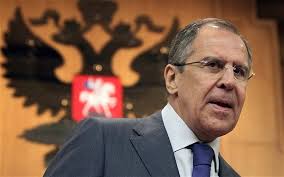
The Russian Foreign Minister Sergey Lavrov was in Brussels on 15 October to give a speech on the ‘European Union’s global role at a time of change’. I went along, curious to hear how Russia views Europe and the EU, only to be disappointed. The EU was hardly mentioned and Europe was brushed away. Now it appears that Europe no longer occupies a major role, though it can produce are ‘ideas and technology’. This is the epoch of the BRICs; the Western world is a thing of the past.
So, emboldened and inspired by Russia’s role in finding one good idea on how to deal with Syria and get Obama out of his conundrum over military strikes there, Lavrov illustrated the country’s views of the world. The bi-polar world is over and the new normal is multi-polarity. State sovereignty is not being challenged by globalization. On the contrary, the traditional diplomacy of states is enjoying a ‘renaissance’, called upon to deal with the world challenges caused by globalization and to shape global governance.
Major ‘poles of power’ should come together to manage international affairs following the example of ‘Russia and the US setting the framework for Syria’, in Lavrov’s words. The sovereign equality among states (well, of some states), non-interference and no use of force accompany this view, with the United Nations as the guarantor of these principles.
By and large, these ideas are not new. They have been set out in Russia’s Foreign Policy Concept last February and were echoed in Putin’s article in the New York Times last September. What was interesting was the way in which these ideas were delivered. Lavrov’s invigorated assertiveness allowed his style to be less aggressive, as if recent events vindicate Russia’s position. He even suggested that Russia may make less use of the UN Security Council veto in the future, though he tellingly added that this would be limited to cases in which pressure wants to be made on another UN Security Council member (which seems to me to be an oxymoron).
But Lavrov’s lost some of his aplomb when the discussion moved to Eastern Europe. It is somewhat ironic that Russia has borrowed the EU’s so-called ‘soft power’ tools, or at least their appearance. According to Lavrov, the Customs Union and the Single Economic Space ideas, part of the more ambitious Eurasian Union Russia is proposing to the countries to its West, are modelled on the EU (which perhaps is not so irrelevant after all) and in line with the World Trade Organisation regulations. Therefore they should not be feared in the rest of Europe. Quite the contrary, ‘excluding Russia has always had terrible consequences on European history’. What the EU should aim for is further cooperation with a more integrated Commonwealth of Independent States, ideally to develop a single space ‘from Lisbon to Vladivostock’.
Then came the mix of defensive positions and accusations: it is not Russia which is blackmailing the Eastern European countries into accepting deeper relations; it is not Russia which is viewing the region as a geopolitical chessboard; it is not Russia which sees the upcoming Vilnius summit as a ‘make or break’ moment for these countries. Add to these recriminations (and Brussels criticizes Moscow with precisely the same arguments) to the serious recent diplomatic incidents which have soured relations with more than one European country, and the November Eastern Partnership summit in Vilnius is set to be very interesting indeed.
Rosa Balfour











